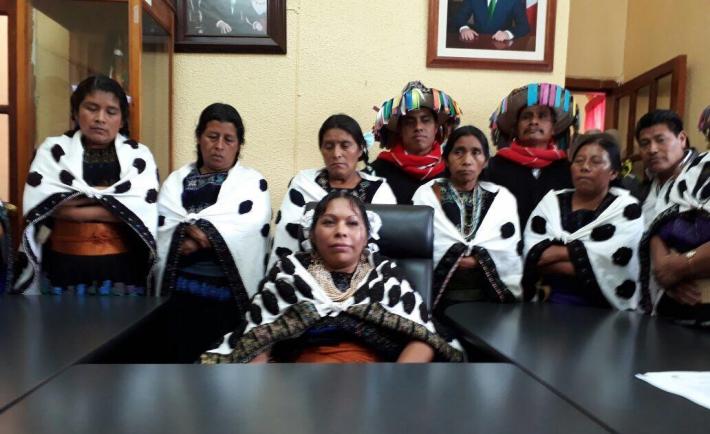
Picture tweeted by Rosa Pérez when she returned to her Municipality Office after the Federal Electoral Court ruled in her favor.
Latin America is the leading region in the world addressing violence against women in politics (VAWP). As a former justice of the Federal Electoral Court in Mexico and as the first woman to be president of that Court, I wish to share my thoughts on the current legal status of the issues in Latin America. I will also provide recommendations on how the campaign can stop this type of violence.
The photo above is of Rosa Pérez, mayor of Chenalhó, Chiapas México, at the time of her reinstatement to the mayorship. Rosa was the first woman to be elected mayor of San Pedro Chenalho, Chiapas. Rosa reported that she was forced to quit her position based on violence she experienced because of her political role – a claim that could not be resolved through a criminal procedure and needed a ruling by the Federal Electoral Court to have Rosa reinstated, confirmed by the Electoral Court. This case reminds us that violence against women in politics creates different types of responsibilities for multiple actors, at various levels within the law, including: criminal, electoral, administrative, civil and even in some cases, international.
This year I was able to attend two important workshops on violence against politically-active women: the United Nations Special Rapporteur on Violence Against Women, Dubravka Šimonović’s, Expert Group Meeting in New York in March, and Harvard University’s seminar on, “Violence Against Politicians,” earlier this month. Both provided me with an opportunity to share my perspective as a former electoral judge and to learn more about how this issue is impacting the world and to provide recommendations on how to strengthen action to stop violence against women in politics in the future.
In Latin America, we are committed to designing a specific model for access to justice for victims of VAWP. Bolivia is the only country in the hemisphere to have a specific national law that conceptualizes and establishes a formal procedure before administrative authorities and the judiciary. Costa Rica, Ecuador, Mexico and Peru have also all approved local legislation and drafted laws before federal congresses. In Mexico, local congresses of 29 states (out of 32) took steps before the federal congress did, and have already conceptualized political violence and codified it as a crime and/or administrative offense, in different laws. There have also been 15 draft laws on gender-based violence presented before both of the Federal Chambers of Congress. Unfortunately, there has not been a single law enacted. However, this does not mean that authorities do not have an obligation to respond, or the legal tools to do so.
Most recently, the Inter-American Commission of Human Rights and Inter-American Court of Human Rights and the Inter-American Commission of Women passed a Model Law on ending violence against women in politics, picking up on known experiences and needs expressed by judges, academics, activists, and politicians; with the objective to contribute technical elements for debates inside parliaments, as well as to promote the passing of the legislation on political violence in the region.
In addition to the actions already being taken, I would recommend that in order to move forward on the issue of violence against women in politics, responsibly and with some urgency, the following actions should be taken:
- Electoral authorities and political parties need to approve protocols that prevent and address political violence in general. In this regard, they must specifically strengthen their capabilities in gender and inclusion, and carry out prevention and awareness campaigns for the full range of political actors. Political parties should work to address this topic within their internal grievance mechanisms.
- The creation of a geo-referenced and analysed database of documented cases of violence against politically-active women, in order to better understand the problem and to design a comprehensive prevention and response scheme.
- The training of personnel of competent public institutions, victims’ services providers, and political party members, to ensure that victims receive the attention they need and have access to justice.
- Ensuring that judicial and administrative bodies guide their work with gender, inclusion and an intersectional approach, as established by international treaties and national laws.
- Bringing test cases on VAWP forward for litigation, in order to achieve evidence, strengthen the culture of denunciation, create jurisprudence, as well as define adequate measures, such as reparations for victims. Training lawyers and political rights defenders on the issue is also essential.
- Amplifying the global advocacy on the importance of equality and the presence of women in politics, in order to fight stereotypes and raise awareness of VAWP and its negative consequences for women and democracy.
- Recognizing and strengthening the networks of civil society organizations, scholars and advocates that work for the eradication of VAWP.
